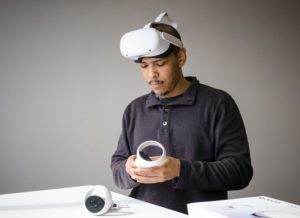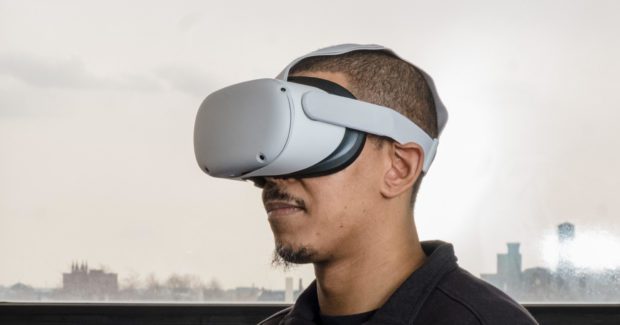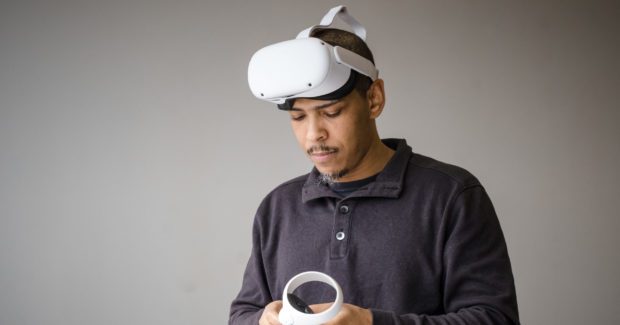Tooling U-SME’s VR Training Curriculum Prepares Visionary Organizations for Rapid Transformation
Tooling U-SME, the leading provider of manufacturing training solutions, is showcasing its new Virtual Labs at IMTS 2022.
Posted: July 28, 2022
Continuing its decades-long tradition of harnessing technology to advance manufacturing training, Tooling U-SME, the leading provider of manufacturing training solutions, is showcasing its new Virtual Labs at the International Manufacturing Technology Show (IMTS), Sept. 12-17, 2022.

This innovative, immersive virtual reality training curriculum bridges the gap between learning and doing to enhance productivity, increase safety, lower costs, and engage a younger workforce. IMTS visitors may experience the Virtual Labs by visiting Tooling U-SME in Booth 431678, the SME Education Foundation in Booth 215100, or the SME Technology Hub in Booth 236900, where live, hands-on demonstrations will be taking place throughout the event.
Using a Meta Quest 2 headset or through their desktop or laptop computer, trainees tap into applied learning through virtual reality. By providing realistic, immersive experiences for learners to work with simulated equipment, Tooling U-SME Virtual Labs accelerate competency for real-world manufacturing situations.
“Just as the manufacturing industry is embracing technology to move better and faster into the future, we can also optimize training and its effectiveness and scalability through leveraging technology,” said Jeannine Kunz, Chief Workforce Development Officer at SME. “Our Virtual Labs help manufacturers and educators engage, onboard, upskill learners to build a high-performing, advanced manufacturing workforce and, ultimately, strengthen the industry’s competitiveness.”
As Smart Technology continues to exert rapid changes on manufacturing, Tooling U-SME has renewed its commitment to helping the industry adapt by providing state-of-the-art delivery methods and leading-edge content to upskill the workforce.
Nearly 20 years ago, Tooling U-SME revolutionized the industry by providing some of the first online classes in manufacturing. As internet technology advanced, the organization continued to enrich its content with videos, animations, and interactive quizzes to aid engagement and retention—and kept pace with methods of delivering training by enabling content on smart phones and tablets.
“With Virtual Labs, we are taking yet another step forward by providing high-tech, experiential learning using the latest technology available,” said Chad Schron, senior director for Tooling U-SME. “As Smart Manufacturing revolutionizes the industry, our mission is to elevate workforce knowledge and capabilities for individuals, manufacturers, educational institutions, and workforce development organizations so they are ready for what’s here and what’s next.”
Applied Learning Model
Tooling U-SME’s distinctive three-pronged blended learning approach separates its immersive training from existing options. Virtual Labs are the centerpiece of an Applied Learning Model. The approach was successfully tested and streamlined through an 18-month pilot program with manufacturers of varied sizes.
“We found the Applied Learning Model really resonated for learners of all ages and experience levels,” said Schron. “This immersive learning lab experience includes a virtual team leader in a bright, clean, modern facility and allows for repeated practice after students or employees gain a baseline knowledge through their eLearning curriculum and before training on real equipment.”
Based on the concept of Learn-Practice-Perform, the Virtual Labs are an efficient way to safely build knowledge that contributes to confidence and proficiency:
- Learn new information through standard instruction.
- Practice skills in a safe, virtual environment.
- Perform tasks and apply knowledge on the job or in the classroom.
First, learners build on the knowledge acquired in the prerequisite Tooling U-SME online classes covering subjects from Machining, Maintenance and Welding to Smart Skills such as additive, digital, cybersecurity, and robotics and automation.
Trainees then put this knowledge into practice as they navigate the virtual environment, demonstrating that they can understand and follow instructions, perform tasks in a manufacturing setting, and answer questions. Finally, through on-the-job training, they perform each task on the shop floor or in the classroom.
Schron said Meta Headsets were selected because they are relatively inexpensive and easy to use, providing a low barrier to entry for any user. As an alternative, computer-based Virtual Labs, available on laptops and desktops, offer a virtual environment that is similar to computer gaming, eliminating barriers to those without a headset.
Virtual Labs will cover subjects such as safety, inspection, assembly, welding and additive. For each Virtual Lab, customers receive a comprehensive skills guide that provides a structured way to set up and integrate the new technology into a blended learning approach.
Subscribe to learn the latest in manufacturing.





